Going indie? Have enough runway to fail once
Former XBLA producer Scott Brodie offers advice for those making the jump, explains how Hero Generations brings Blizzard dev philosophy to indie games
In the past few years the indie scene has definitely picked up momentum, and with free tools and digital distribution, barriers to entry are lower than they've ever been for aspiring devs or industry veterans who decide to go it alone. Scott Brodie falls into the latter category. The former Xbox Live Arcade producer helped ship and develop over 20 XBLA while at Microsoft, and he's worked in numerous game development disciplines at a variety of other AAA and independent game studios. Today, Brodie and his studio Heart Shaped Games is launching a strategy/rogue-like title called Hero Generations, which was successfully funded with over $46,000 on Kickstarter.
The path to launch wasn't so easy, however, and Brodie learned a great deal during his time at Microsoft and working with other indies. Leaving Microsoft and launching a studio was a risk, but Brodie could at least take comfort in the knowledge that he was doing everything he could to mitigate that risk.
"What I tell people now is that looking at it in hindsight I would definitely advise in having enough runway to fail at least once. Whatever that means - one or two years of savings. Inevitably, you're going to learn a lot on your first project and you want to have time to convert that into your next one to be more successful. I had that a little bit in mind and it's proven to be the case," he told GamesIndustry.biz.
"I had a little less trepidation about going indie, but I learned a lot. I chose to stay small instead of growing into a bigger team; I've always been about 1-3 people"
"Going back to the actual event of leaving, I felt like being at Microsoft on that Xbox Live Arcade team I was exposed to a lot of different teams and to a lot of different business models and a lot of different paths to success or failure. So I felt like I had a nice insight into how the industry worked a little bit and some of it was relevant and some wasn't. I had a little less trepidation about going indie, but I learned a lot. I chose to stay small instead of growing into a bigger team; I've always been about 1-3 people."
Staying small and learning from failure were probably the two biggest keys for Brodie. Hero Generations was actually an IndieCade finalist back in 2011, but the game had to be revamped before Brodie attempted to launch it on Kickstarter.
"After I left Microsoft, I worked on this game for about a year, released it on the web, and it made about $44 in that incarnation. After it didn't do so well I set it aside, worked on another project, a collectible card game, for two years to pay the bills and just to keep it going forward. Over that whole experience of play testing it and getting it out there and talking I learned a lot, and then stepping away from it for a while also helped me learn a lot about how to change the game, the pitch of it and everything to prepare for Kickstarter. I feel like a lot of people enter Kickstarter in a different phase of the project, but it was ultimately helpful to have all that time to learn before pitching it," Brodie noted.

Indeed, while some backers of Kickstarter projects feel like developers are playing around with their money and experimenting with designs, Brodie learned that people reacted more favorably to a well thought out approach. "When it came time to put it on Kickstarter, I actually had a pretty polished prototype build and I had a lot of learnings done ahead of time so I came at it where I wasn't going to be doing a lot of design learning with people's money. I felt like I had a strong vision of what the game was and it was more about executing on the production," he said.
It also helped that he didn't get bogged down with managing rewards on Kickstarter. Despite hitting multiple stretch goals, Brodie wisely chose to avoid physical product fulfilment.
"We made a conscious decision not to do any physical rewards. I think where a lot of people are getting into trouble is they're spending so much time with shipping labels and international shipping and getting t-shirt designs made, so we've reduced all of that stuff and all the rewards we did give were things that were in the game, like getting people's names in the game, naming bosses after them, things like that. I think that was a smart business decision for us. Again, being small, thinking about scope. That has allowed us to be successful so far," he emphasized.
For Brodie and Heart Shaped Games, keeping team size and project scope small will hopefully allow Hero Generations to emulate other indie success stories, like Monument Valley or Octotdad. As Lorne Lanning commented recently, it's all about having a sustainable business, and if you can double your money, that's fantastic.
"My risk mitigation plan was stay small, keep my burn low and keep the scope of the project small and my bar for success low. Even now, fast forwarding to the end of this Kickstarter, and launching Hero Generations, I look at it as if we sold 10,000 copies I'd be happy and that seems more than achievable on something like Steam," Brodie remarked. "So by staying small I maybe lowered the potential quality bar or the intangibles of what scope I could achieve but I've purposefully chosen 2D games, simple strategy games, that aren't graphically intensive - it's about making smart choices to put myself in a position to succeed."
Brodie added that he's hoping for "moderate enough sales to support me for the next year and ideally the next couple years, so I have a little bit of breathing room to figure out what's next or spend time continuing to flesh out and make Hero Generations better." He's also aiming to establish Heart Shaped Games as a creative studio "that makes great original games that possibly could be inspiring to other developers... because that's the goal, we're trying to do something a little bit different."
"The overall philosophy which someone pointed out to me is the same philosophy as Blizzard, which is taking these hardcore genres [and] finding a way to pare that back and make it understandable"
Hero Generations is definitely a little bit different. It's been labeled as a mixture of Civilization and Zelda with a hint of Jason Rohrer's Passage, as the main character actually loses a year of his life for every step he takes. The goal is to explore a procedurally generated world "in search of fame and a mate before you die." Interestingly, when your life ends, you continue playing as your child, and the choices you made as a parent will directly affect how you get to play as your child. It's easy to see how this game's theme can lead to some personal introspection.
"It's a small scale of game but I actually think the depth of topics and what the game gets into is actually quite nuanced," Brodie said. "It would certainly be a metric of success for me if people noticed that after they play it."
He continued, "Underlying the game, the system is built around a personal dilemma of balancing personal goals like being a successful independent developer and balancing making games with family life. We have to juggle things in life that are important, so how do you choose your path and how do you balance those things? So the game from a mechanical perspective takes all these different things you can do and puts them at odds and makes you make hard decisions. And so I think that's the crux of it, and I've made it abstract enough to where people can project their own paths and hopefully pull out their own meaning from it."
Making games that are meaningful, as opposed to the roller-coaster thrill ride shooters we often see populating the AAA space, is an indie trend that Brodie is hugely encouraged by and he's happy to be a part of it.
"When I started this, I was asking 'where are these games?' And over time, I've personally felt the indie community has produced some games that are proving that it can be done and they've had some big successes. I look at something like Papers, Please or Journey or even something like Minecraft, which people might say is more like a traditional game, but I think underlying it there's some really interesting commentary on survival, and I think it really reveals in a way that a history book couldn't what it was like to come to the New World and build something and explore. Even in something like that I just find that there are interesting lessons to be pulled that are beyond what we've seen in the past in the industry," he mused.
While Hero Generations deals with tough choices in life everyone is confronted with, Brodie wanted to ensure that gameplay remains as accessible as possible for any type of player.
"The overall philosophy which someone pointed out to me is the same philosophy as Blizzard, which is taking these hardcore genres - you see what they're doing with Heroes of the Storm now as an example, MOBAs being known as overwhelming with lots of stats and things to do and they are finding a way to pare that back and make it understandable. I think on a smaller scale that's what I'm trying to do, which is take something like a rogue-like or 4X strategy, which are traditionally complex genres, and I've turned into all you have to do is move one space with a single character but there's still this incredible depth that unfolds just from that simple mechanic," he explained.
Hero Generations will be on Steam and Ouya (thanks to the Free the Games Fund), but Brodie hasn't ruled out mobile for the future. Coming from the console world, you might think that PSN or XBLA could be in the cards, but again, it's all about mitigating risk.
"There's a lot more risk there than people might think, and that's all it came down to. It's not trivial to port a game or build a game for mobile, and the same for console, and there's just a lot of costs that come with that. So my view, and a lot of this learning has come from a lot of the mentors I've had in the industry highlighting that - why not start small, use the PC which is lower risk overall in terms of development time, test it out to see if there's any traction for the idea and then invest in these other platforms. I'm not committing at all to doing mobile but if this is successful I'd love to find a place for Hero Generations on mobile," he said.
The game itself is built on Flash, and if there's one thing Brodie regrets it's not having learned Unity or some other program, which would facilitate more cross-platform releases. "[Flash is] what I'm proficient in and that's what I felt comfortable with - I didn't feel comfortable learning a brand-new engine for this project," he admitted. "I 100 percent think if I had a little bit more time it may have been worth it to invest in a Unity version of the game but again, trying to reduce the variables on my side and maybe that hurts my long-term potential."










